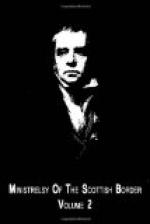PART SECOND.
ROMANTIC BALLADS.
Scottish Music, an Ode
Introduction to the Tale of Tamlane
The Young Tamlane
Erlinton
The Twa Corbies
The Douglas Tragedy
Young Benjie
Lady Anne
Lord William
The Broomfield-Hill
Proud Lady Margaret
The Original Ballad of the Broom of Cowdenknows
Lord Randal
Sir Hugh Le Blond
Graeme and Bewick
The Duel of Wharton and Stuart, Part I.
Part ii.
The Lament of the Border Widow
Fair Helen of Kirkonnel, Part I.
Part ii.
Hughie the Graeme
Johnie of Breadislee
Katherine Janfarie
The Laird o’ Logie
A Lyke-wake Dirge
The Dowie Dens of Yarrow
The Gay Goss Hawk
Brown Adam
Jellon Grame
Willie’s Ladye
Clerk Saunders
Earl Richard
The Lass of Lochroyan
Rose the Red and White Lilly
Minstrelsy
of the
Scottish border.
PART FIRST.—CONTINUED.
HISTORICAL BALLADS.
LESLY’S MARCH.
“But, O my country! how shall memory
trace
“Thy glories, lost in either Charles’s
days,
“When through thy fields destructive
rapine spread,
“Nor sparing infants’ tears,
nor hoary head!
“In those dread days, the unprotected
swain
“Mourn’d, in the mountains,
o’er his wasted plain;
“Nor longer vocal, with the shepherd’s
lay,
“Were Yarrow’s banks, or groves
of Endermay.”
Langhorn—Genius
and Valour.
Such are the verses, in which a modern bard has painted the desolate state of Scotland, during a period highly unfavourable to poetical composition. Yet the civil and religious wars of the seventeenth century have afforded some subjects for traditionary poetry, and the reader is here presented with the ballads of that disastrous aera. Some prefatory history may not be unacceptable.
That the Reformation was a good and a glorious work, few will be such slavish bigots as to deny. But the enemy came, by night, and sowed tares among the wheat; or rather; the foul and rank soil, upon which the seed was thrown, pushed forth, together with the rising crop, a plentiful proportion of pestilential weeds. The morals of the reformed clergy were severe; their learning was usually respectable, sometimes profound; and their eloquence, though often coarse, was vehement, animated, and popular. But they never could forget, that their rise had been achieved by the degradation, if not the fall, of the crown; and hence, a body of men, who, in most countries, have been attached to monarchy, were in Scotland, for nearly two centuries, sometimes the avowed enemies, always the ambitious rivals, of their prince. The disciples of Calvin could scarcely avoid a tendency to democracy, and the republican form of church government




